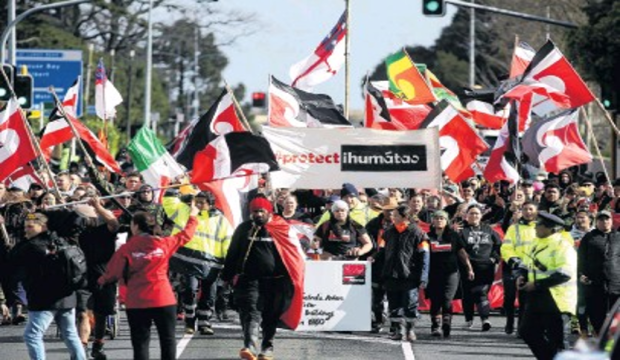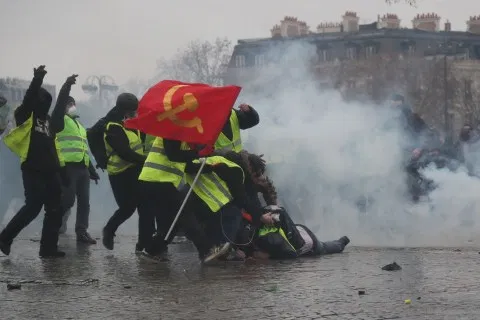
Hikoi in support of the land occupation at Ihumātao, Auckland, Aotearoa/NZ
Ihumātao began as Māori land used for gardening. After British colonisation in the 1840s it also supplied the settlers in Auckland. But the Treaty was a fraud and Māori land presented a barrier to capitalist colonisation. In 1863 it was confiscated and the people driven off the land as the settlers went to war against resistance to land sales. From that point on Ihumātao was swallowed up by Auckland as it burgeoned as the main entry point for Empire. In 1867 the colonial state sold the land to private owners, the Wallace family, who farmed it for generations until recently when it was sold on to Fletcher Building for new housing.
In 2016 a protest occupation led by rangitahi (youth) demanded the land be returned to Iwi in opposition to agreements made by some kaumatua (elders) with Fletcher Building to keep the land in exchange for homes for Iwi. Trespass notices and threats of eviction drew massive support. Government stepped in to halt building, the Tainui King, Te Arikinui Kiingi Tūheitia intervened as a mediator, but to date there has been no settlement of the dispute.
Any settlement that falls short of the full return of the land to the Iwi will be a compromise that props up private property rights at the expense of the Iwi right to communally owned land. The purpose of this article is to explain why the fight for the return of communal land is more than a matter of historical justice for dispossessed Māori, but critical in re-uniting the people with the land and to bring an end to colonialism and the threat of human extinction.
Capitalism’s three foundation stones
Ihumātao signifies the collision of the colonial history of Aotearoa with Capitalism’s terminal crisis. The underlying contradiction between Maori communally owned land and land held as private property in the capitalist system is explosive. Colonisation introduced the three foundations stones of capitalism to Aotearoa. Marx called them the ‘Holy Trinity’ of Land, Labour and Capital. First, colonialism converts land from common ownership into private property where ownership allows the wealth of the land to be accumulated by the private owner. The land is not used unless it makes a profit (produces rent) by selling its product on the market. It cannot do so unless it can create ‘free’ labour and has access to capital.
Second, private property introduced under capitalist colonisation separated the people from the land. Separated from their own means of subsistence (nature) they were “free” to labour for the capitalist land owners for a wage. Third, capital as money is necessary to invest in production to buy the raw materials and employ wage labour to produce the commodities to sell in the market. Karl Marx was clear how this “Holy Trinity” worked in the settler colonies. He referred to the case of Mr Peel who brought his money to Perth, Australia, bought stolen land and employed landless labourers, only to find that they deserted their jobs and went to settle on land they occupied for themselves. There was then no way he could profit from their labour so he ended up as a land agent speculating in stolen land.
The contradiction between communal and private land is explosive because capitalist ownership of land allows the monopoly of a scarce resource in the hands of a minority while the majority are deprived of land for settlement and production. Today this issue has become critical because of capitalism’s destructiveness and the impact of climate change cannot be stopped unless land is returned to communal ownership for the use of all as part of reuniting the people with nature.
Private property vs communal ownership
This explains why both National and the Labour-led coalition are refusing to risk setting a precedent at Ihumātao that could then allow claims on private property as part of Treaty settlements. In 1840 the Crown was ready to promise Maori ownership of their land unless they willingly sold it, but in practice condoned forced sales and engaged in confiscations so that today only around 3% of Māori land remains. The Crown cannot return privately owned land to its original owners without destroying one of the foundation stones of capitalism – the private property rights.
That is why Maori leaders compromise with the Government in accepting the terms of Treaty settlements. Compromise with colonial regimes may be necessary at times for survival but it is important to understand what is at stake. Just as the land sellers of yesterday found themselves collaborating with Empire at a big cost to Māori development, today Iwi capitalists, such as the Tainui King and others Iwi leaders, compromise with global imperialism which is destroying nature and the survival of all of humanity.
So, the conflict over Ihumātao is a test case over which form of land use will prevail in Aotearoa – that of land as private property introduced by the settlers, and land as communal property as the basis of a classless, communal society. The lessons of the colonial wars over land from the 1840s onward culminating in the invasion of Parihaka in the early 1880s makes this clear. Te Whiti rejected the privatisation of land because it was not for communal use but for profit. He thought that land should remain in communal ownership and that its produce be exchanged without the use of money. For him capitalism as represented by the market and money were evil intrusions into Māori society which must be resisted. Idealistically he believed that his non-violent protest would resolve the contradiction over land ownership between the two worlds.
Such a stand against the settler society by the Parihaka commune became a refuge for many of the former fighters in the land wars, including Titokowaro. This was seen, correctly, as a rebellion against the foundation stones of colonial capitalism. There was no way that the settlers would observe the Treaty and tolerate communal ownership of land. That would scupper the whole colonial enterprise and the racist doctrine of the ‘civilising mission’. It is this racist, colonial tradition that is kept alive today by private landowners, corporates like Fletchers, Federated Farmers, along with their bourgeois State, the Law, the Government, and we must include, today, the Iwi capitalists who benefit from Treaty settlement profits at the expense of their own people.
Apologists for private property
It is not sufficient however, to expose the historic capitalist class interests behind the privatisation of land, it is also necessary to expose those paid ideologues who weave fanciful stories about why land theft is part of the march of civilisation. There is a long history of settler story-telling that talks about the progress of white settler colonisation going back to Wakefield and Governor Grey. Of course, these individuals were, and are, cynical apologists for capitalism solving its problems in Britain (economic stagnation, unemployment and crime, to name the most important) by selling the idea that white settlement was a benefit for all humanity. It exported ‘civilisation’ to the ‘natives’ including an economic system held to be the most advanced in the ‘history of man’.
But isn’t it clear today that civilisation has yet to be tried, as Gandhi implied, and that what passed for it in 19th century Aotearoa was, as Te Whiti maintained, ‘evil’? The Treaty ‘settlement’ process has righted the ‘wrongs’ even at a tiny fraction of the value of the lost land. And hasn’t there been a Māori Renaissance and a healthy scepticism towards James Cook among others as benefactors of Māori? Well, no. One cannot say that Māori became better off as beneficiaries of capitalism without using colonialist criteria. The celebration of White Settler Colonisation is still observed because it is contested terrain – specifically contested land rights.
If we look at the work of contemporary writers on NZ colonial history, we can see most remain apologists for white settlement, subject to the usual provisos of course about capitalist ‘excesses’, or even more slippery, ‘human nature’. Let’s take one prominent example, James Belich, who made an international reputation with his books on the NZ Wars, and won some fame with the TV series that followed. In his early work Belich does much to dispel the colonisers’ myths that Māori were ‘inferior’ to White Settlers. For example, they would certainly have defeated the settlers in warfare without the help of imperialist troops. But in his later book Replenishing the Earth, The Settler Revolution and the Rise of the Anglo-World, 1783-1939, Belich raises his sights and attempts to ‘replenish’ the British empires expansion in the colonial world as a ‘successful’ and therefore progressive extension of British capitalism.
Belich’s “Settler Revolution”
Belich sets out to prove that the British settler colonisation of other territories including Aotearoa was a ‘settler revolution’ that, because of its influence in creating the modern world, should be added to the other major revolutions, for example, the English (bourgeois) and Industrial Revolutions. He shows how the economic busts in Britain led to the export of settlers whose own economic activity in new lands led to further trade in commodities which fed new booms in Britain. Yet there is little new here that wasn’t understood by early British capitalists and their apologists such as Adam Smith. And it ignores Marx’s law of falling profits which drove the export of British surplus capital and people to new lands to establish capitalist production and create ‘super’ profits to restore those at home.
Sadly then, Belich’s “new explanation” of White Settlement as the ‘settler revolution’ is separated from the deeper history of capitalism as a global system. Inevitably, in the larger scheme of things, his ‘revolution’ was (and is) part of a global ‘counter-revolution’ that founded and expanded empire for profit at the expense of pre-capitalist peoples and the destruction of nature. This counter-revolution broke pre-capitalist peoples’ unity with nature and subjected them to capital’s drive to dehumanise them and destroy nature. Not only in Aotearoa/NZ where the Treaty was always, and is still, a fraud, but right around the world where indigenous peoples remain oppressed and unfree. And where imperialism occupies and dominates, by ruling directly, or through their client states, most of humanity still pays a heavy price for the barbarity of capitalist ‘civilising mission’.
Add to that indictment, the most notorious case of white-settler colonisation, the founding of Zionist Israel, as if to express the pure Orientalist scorn for ‘uncivilised’ peoples, at the same time as the decolonisation struggles for independence were under way. That is why White Settler Colonisation stands everywhere as a memorial to the expansion of capitalism at the expense of nature and human freedom. The only thing to ‘celebrate’ about it is the realisation that out of the failures of previous struggles for self-determination, workers and oppressed people of every kind will continue that struggle to win their freedom by means of permanent revolution and the free association of socialist republics on a global scale.
Towards the Commune
It is evident the black heart of the colonial occupation of Aotearoa/NZ remains in the privatised land at Ihumātao. The communal land was stolen as part of the separation of Māori from their land and the creation of capitalist private property. But beyond the injustice and the cost to Māori over the generations, the fate of the land is emblematic of the future course of Aotearoa. If the land remains in private ownership or is ‘nationalised’ by the Auckland Council and the central government, it is not restored as communal land. A token settlement with Iwi elders, might claim to return it as Māori land. But we have seen what ‘Māori land’ under the Treaty settlement process means, it remains incorporated within capitalism, and does not meet the needs of most Māori while it elevates Iwi ‘authorities’ as a new Māori capitalist class.
Any compromise on the terms of colonialism by either Settler or Māori institutions that serve to protect private property, whether as a state reserve, or in trust to a compromised Iwi leadership, would leave Māori separated from communal ownership. They would suffer the same fate as Parihaka, without having the opportunity to follow Te Whiti’s example and fight to defend the land. The land would remain lost and so would the opportunity to demonstrate that communal land as a basis to contest and replace the ‘evil’ colonial system that over the centuries has come to the point of destroying nature and threatening human extinction.
What would Ihumātao mean if the stolen land was won back? It could combine Māori values of communal land with the needs of the wider working class to produce collectively rather than for private profit. The application of the knowledge and technology of pre-capitalist and capitalist society (all the result of workers labour) could produce the embryo of a future post-capitalist society capable of restoring the unity between humans and nature.
That is why the struggle for the return of private land as communal land thrusts at the very ‘heart of darkness’ of White Settler colonialism/imperialism, its economic interests and its political institutions and cultural values. We need a social revolution against all these fronts to succeed in turning private property into communal property. And there is a great unifying cause that can make this happen – the global crisis of collapsing climate and nature’s revenge. If we are to make the changes necessary to slow down, mitigate and even stop climate change we need to overturn the foundation stones of capitalism.
Overturning the foundation stones
The first is the private ownership of land, because without it, and production for profit, the whole speculative edifice of capitalism would collapse. It would mean Māori, Pakeha and all other workers, along with working farmers, who are the huge majority and the producers of wealth, uniting around a political program to collectivise the land to feed the people sustainably as climate crisis hits. Their means of subsistence returned to them, workers and small farmers could then produce for need and not profit. Industry would be socialised so that its accumulated wealth becomes a fund for collective economic planning. Private banks would be socialised into a peoples’ bank to fund social production. The state’s defence of private property would collapse when workers and small farmers organised their own councils and militias. All this would be possible under new social relations that do not separate producers from the wealth they create when they are reunited with the land. But before that can happen the Commune needs to speak to the people.
Ihumātao can become the example that proves it is necessary to restore the land as communal property before we can completely change the rest of society. That we can build a new society based on communal ownership of all the essentials necessary to make a transition from capitalism to the commune. It could demonstrate that workers organised in collectives can decide democratically what resources are needed to meet the basic needs of the community, allocate them to production for those needs, and ensure that they are not destructive of nature. It can prove to workers and small businesses trapped by worsening economic crises, wars and climate collapse, of the necessity of transforming production, distribution and exchange to meet essential needs for food, housing, education, health and transport in Aotearoa, and to share locally, nationally and internationally in a world where the old order is dying and the new order is yet to be born. Only then would the Commune start to become the reality.
https://tinyurl.com/v8rt9jj Evan Poata-Smith (1996) “The Evolution of Contemporary Protest” pdf
https://situationsvacant.blog/2008/02/13/antipodean-marxism-meets-indigenous-peoples-struggles-2000/





